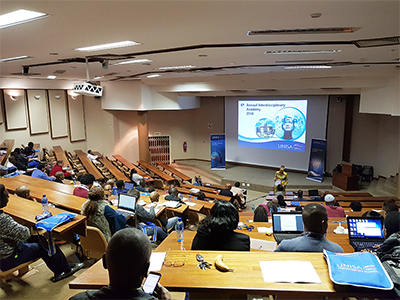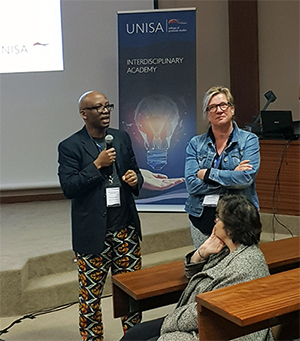

Dr Daisy Selematsela (Executive Director: Unisa Library) addressing the interdisciplinary science-society academy during the official opening
“You learn how to cut down trees by cutting them down,” says a Bateke proverb—an attestation to the strategic revamp and approach of the sixth Annual Interdisciplinary Academy, formerly referred to as the Interdisciplinary Summer School.
The name of the 2018 event was not the only shift. Another was the move from talking about research to practically doing research under the guidance of nationally and internationally acclaimed scientists.
The academy, spearheaded by the College of Graduate Studies (CGS), took place from 28 to 30 May 2018 at the Unisa Science Campus.
Recognised as a strategic project, the academy has the objective of increasing the number and quality of master’s and doctoral graduates produced by the institution, according to Professor Kitty Dumont, the co-project leader.
In the next five years, the academy will expand into a more ongoing interaction between researchers and students in the six streams of men and violence, social protest, drug discovery, cosmology, water scarcity, and sustainable energy.
These streams will address pressing scientific, socio-economic, and political issues throughout the year. “I am certain that some of your ideas, even those at a developmental stage, will benefit the wider community through research collaborations,” said Professor Michelle Havenga, CGS Executive Dean, addressing postgraduate students and postdoctoral fellows.
Participants, registered at Unisa and other universities, will acquire practical and applied knowledge and skills in designing, conducting and presenting innovative solutions that are research based.

Prof Kopano Ratele and Prof. Kitty Dumont, co-project leaders of the Annual Interdisciplinary Academy
“The future plan for the academy is to go beyond proposals and start focusing on research as teamwork in order for participants to publish with other authors and to develop a research environment,” said Professor Kopano Ratele, co-project leader.
During the opening week, stream leaders and students defined their research plans, which will be explored from June to October through stream seminars and research activities. Then, from 5 to 9 November, the interdisciplinary science-society academy will meet again to wrap up research projects and disseminate research conducted, together with its findings and recommendations.
Professor Bheki Mamba, Executive Dean of the College of Science, Engineering and Technology, encouraged master’s and doctoral candidates to read a wide range of academic material as this would serve as an important research process as they underwent the research journey.
*By Mpho Moloele
Publish date: 2018-06-26 00:00:00.0